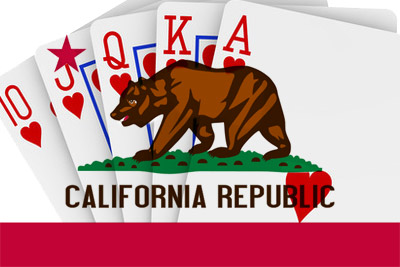Online gambling is now available in most countries in the world but in the United States just three states offer the ability to gamble online. In addition, the gambling landscape throughout America is changing rapidly with casinos in nearly every state. These topics have been 'hot button' items for many stories in 2014, but it doesn't end there. Hartley Henderson lists his top 10 gambling stories of the year, including his #1 story below. This is second of two parts. To read stories 6 through 10, click here.

5 – The continued infighting by Tribal Groups in California
Ever since the passage of the UIGEA California was expected to lead the way with an online poker site but infighting between the horse racing industry, the land based poker rooms and the Indian tribes caused all plans to come to a screeching halt. For years the groups were arguing about who should get the bulk of the profits, who should be allowed to offer online poker and where the sites should be hosted. Despite efforts by several legislators at both the state and federal level an agreement could never be made. Major strides were made in the last two years when the Indian tribes, who were the biggest holdouts, agreed to allow online poker with the proviso that they could host online poker sites along with companies like Caesars and most importantly that any non-poker online sites would be the exclusive domain of the tribes. The horse racing industry apparently agreed to back out also realizing that online poker was not going to hurt the horse racing product.
 All seemed a go at the end of last year when Senator Lou Correa introduced the Internet Poker Consumer Protection Act of 2014 which would enable online poker in the state with certain provisos. Namely all betting had to take place in California, owners and employees had to reside in California and all bank accounts had to be kept in the state. The bill also had rules related to problem gambling, age verification, geo verification and a bad actor clause that excluded any site from obtaining a license if that site catered to the U.S. market after the passage of the UIGEA. That clause was specifically designed to exclude PokerStars. More than likely the bill would have passed easily a couple of years prior but in the interim the Morongo Tribe inked a partnership deal with PokerStars and they indicated they had no interest in signing any bill that included the bad actor clause. As a result the bill stalled and online poker failed to be introduced.
All seemed a go at the end of last year when Senator Lou Correa introduced the Internet Poker Consumer Protection Act of 2014 which would enable online poker in the state with certain provisos. Namely all betting had to take place in California, owners and employees had to reside in California and all bank accounts had to be kept in the state. The bill also had rules related to problem gambling, age verification, geo verification and a bad actor clause that excluded any site from obtaining a license if that site catered to the U.S. market after the passage of the UIGEA. That clause was specifically designed to exclude PokerStars. More than likely the bill would have passed easily a couple of years prior but in the interim the Morongo Tribe inked a partnership deal with PokerStars and they indicated they had no interest in signing any bill that included the bad actor clause. As a result the bill stalled and online poker failed to be introduced.
Nothing could be worked all year so in a bizarre move Assemblyman Mike Gatto introduced a revision of the same bill called the Internet Consumer Protection Act of 2015 in November. The bill is identical to the previous one except residents would be required to make their first deposit in person at a land based poker room or Indian casino before their account would be verified. More importantly the bad actor clause was kept only this time it was made more restrictive. According to the wording of the act "any person, site, or covered asset that knowingly engaged in unlawful Internet gambling after Dec. 31, 2006 would be excluded from receiving a license." Thus PokerStars would still be excluded despite the purchase by Amaya Gaming and any personnel that worked in sites that were catering to the U.S. market in 2007 or later would be excluded. Under that wording it's possible that Pala Interactive would be excluded also since Jim Ryan worked for Excapsa (the owners of Ultimate Bet) in 2007. It is an urgency statute and requires 2/3 consent to pass but with the Morongo Tribe, another tribe which teamed up with PokerStars and the Pala Indianswho are very unlikely to agree to the terms, thus it seems this new bill has no shot of getting off the ground. More than likely the only way a bill could ever pass is if the bad actor clause is left out but that won't happen because the state legislators and the tribes that aren't connected with PokerStars or Excapsa have no desire to eliminate it. As such it seems like online poker at California is still way off, despite the new bill.
4 – The ongoing war by Sheldon Adelson to block online gambling
Sheldon Adelson has been attempting to block online gambling for almost 2 years. Adelson, the Las Vegas Sands owner and large donator to the Republican Party has laughingly taken the moral high ground stating that he opposes online gambling because he fears it will lead to underage betting and compulsive gambling and it will target the poor. But the truth is that Adelson realizes thatin the online gamblgin realm the Sands would likely be a bit player and he doesn't want to risk his land based profits at the expense of huge online profits from Caesars and MGM. Consequently Adelson enlisted several Republicans to help him stop online gambling. Last year he started the website stopinternetgambling.com and hired on the likes of Richard Gephardt and Alphonse D'Amato as the front men for the effort. Most in the industry just attributed the motion as a confused and desperate attempt by an old man who doesn't understand technology but studies have shown that Adelson has indeed made traction. In 2014 Steve Wynn has taken sides with Adelson to oppose online gambling and several state senators including Nikki Haley, Rick Scott and Rick Perry have all chosen to back Adelson's motions. Moreover the co ntributing members of stopinternetgambling.com include many significant lobby groups including the Christian Family Coalition. Why the various churches and social groups have a problem with online gambling but not land based gambling is mystifying but that's beyond the scope of this year in review article. Most importantly Adelson has apparently convinced the American Gaming Association to stop supporting online gambling despite the fact that the AGA was one of the original proponents for online gambling. One can only assume that the Sands and Wynn are more intriguing to the AGA at the moment given the financial crisis that Caesars and MGM are in.
ntributing members of stopinternetgambling.com include many significant lobby groups including the Christian Family Coalition. Why the various churches and social groups have a problem with online gambling but not land based gambling is mystifying but that's beyond the scope of this year in review article. Most importantly Adelson has apparently convinced the American Gaming Association to stop supporting online gambling despite the fact that the AGA was one of the original proponents for online gambling. One can only assume that the Sands and Wynn are more intriguing to the AGA at the moment given the financial crisis that Caesars and MGM are in.
So, in 2014 Adelson increased the pressure by convincing Lindsay Graham and Jason Chaffetz to sponsor bills in the Senate and House titled the "Restoration of America's Wire Act." The bills are intended to make the 1961 Wire Act the primary piece of legislation for gambling in the U.S. and to change the language to make all forms of Internet wagering illegal. If this goes forward then it would supersede the UIGEA thereby making internet gambling illegal at the state level too. Most importantly the bill aims to make null and void the DoJ's 2011 interpretation of the Wire Act where they deemed it was only intended for sports wagering.
Chaffetz was quoted as saying "It should not be a single person in the bowels of the Department of Justice reinterpreting the law and fundamentally changing the landscape," when introducing his bill and Graham was quoted as saying "if you want to have online gambling, then come to the Congress."
The bill has the support of several Republican Governors and apparently Adelson has asked Harry Reid for a favor by supporting the bill to get more Democrat support as well. Whether Reid will sell out and do so is only to be seen but there's no question that Adelson was a major story maker in 2014 and wil continue to be for the foreseable future..
3 – The disappointing performance of online gambling in New Jersey
Analysts predicted that if New Jersey allowed online gambling it would be a game changer for the state. Some analysts threw out estimates in the hundreds of millions a year in revenue and if online poker networks were allowed across the U.S. some analysts believed New Jersey could even recognize revenues in the billion dollar range. So when Governor Chris Christie finally signed the online gambling bill in his state in 2013 most of the state's legislators were elated. Upon signing the bill Christie stated "This was a critical decision, and one that I did not make lightly. I am confident that we are offering a responsible yet exciting option that will make Atlantic City more competitive while also bringing financial benefits to New Jersey as a whole."
Christie estimated an 85% increase in tax revenue in the first year as a result of online gambling and a projected $13.4 billion in revenue in the first 5 years. In fact Christie suggested that New Jersey would bring in $180 million in tax revenue in the first year from online gambling. Christie was in for a shock. The first site Ultimate Poker began operating in December 2013 followed by WTP (Caesars) and Borgata. Betfair joined Trump Plaza to set up an online gaming network, Ultimate Gaming partnered with the Trump Taj Mahal to set up a network, the Borgata joined forces with Party Poker and Caesars went all in with WPT which should have set online poker on its head just based on the name itself. But it didn't.
Signups started very slow and really never picked up. As of last month there was an estimate that in its first year of operation New Jersey online gambling was only going to generate about $125 million in revenues which of course was less than 1/8 of Christie's estimates and tax revenues would only amount to about $12 million. To make matters worse the Trump Plaza closed leading Betfair to announce it was cutting its New Jersey poker operations after it only raked $50 in the whole year prior (although it was going to continue with the online casino venture in partnership with Caesars) and Ultimate Betting closed after making little impact in its partnership with the Taj Mahal. The WPT site is apparently the most lucrative site although even there the revenues are far less than what Caesars had envisioned. The reason for the low handle in casino gaming is uncertain although payment processing, lack of effective advertising and distrust in online slot machines and card game were deemed to be the main reasons. As for poker the main reason for the failure seems to be what Caesars stated years ago when petitioning for a federal bill. In a single state there are just not enough players and with so many sites vying for the same few gamblers the tables are generally empty. If poker was legal throughout the U.S. it is accepted that tables would be full as they are at PokerStars and Party Poker which takes players from hundreds of countries at once. But online poker just isn't feasible one state at a time. It should be noted that the casinos have admitted that the results are extremely disappointing but they are still hopeful for a turnaround.
2 – The closure of Atlantic City casinos.
Up until recently land based casinos were viewed as the one industry where it's impossible to lose money. It is supposed to be recession proof and because the house always wins a casino can't lose money. It seems no one told that to the casino owners in Atlantic City. Casino gambling began in Atlantic City in the late 1970s after New Jersey residents passed a referendum to legalize the activity and it was an instant hit. Atlantic City became a  tourist destination and a place for East Coast gamblers to venture who didn't want to fly all the way to Las Vegas. Aside from weekend jaunts many gamblers from places like Chicago, Miami and Toronto took advantage of Atlantic City casino sponsored red eye junkets where bettors arrived at Atlantic City at dawn, gambled their brains out until late evening and headed back on the red eye. The industry was thriving and so were the casinos. Unfortunately while money was pouring into the boardwalk where the casinos were scattered little was done in the outlying areas and as a result crime rose. It became well known that as long as you were on the boardwalk you were fine but anyone who ventured outside of the boardwalk was taking a huge safety risk. For Atlantic City residents the casinos did little to help them directly.
tourist destination and a place for East Coast gamblers to venture who didn't want to fly all the way to Las Vegas. Aside from weekend jaunts many gamblers from places like Chicago, Miami and Toronto took advantage of Atlantic City casino sponsored red eye junkets where bettors arrived at Atlantic City at dawn, gambled their brains out until late evening and headed back on the red eye. The industry was thriving and so were the casinos. Unfortunately while money was pouring into the boardwalk where the casinos were scattered little was done in the outlying areas and as a result crime rose. It became well known that as long as you were on the boardwalk you were fine but anyone who ventured outside of the boardwalk was taking a huge safety risk. For Atlantic City residents the casinos did little to help them directly.
Things began to turn for gambling in Atlantic City around the time of the financial crisis in the late 2000s. With surrounding states in a bad financial state they began to look at casino gambling as a way of bolstering their coffers as well. Casinos popped up in Connecticut, Pennsylvania, Delaware, Maryland and New York (many as Tribal casinos which agreed to pay the state a percentage of profits) and as a result there was less incentive for people to travel to Atlantic City when there was a closer casino. In fact today there are 25 casinos within a 100 mile radius of Atlantic City. Governor Chris Christie announced a plan to beautify the city to try and attract more tourism and he made a decision to require companies to have a physical location in Atlantic City to offer online gambling but it was too little, too late. Companies just could no longer continue to absorb losses and in 2014 four large casinos closed.
The first casino to close was Atlantic Club in January and with it were job losses for about 1,200 people (albeit the casino could have survived if the sale to PokerStars was approved). In August the Showboat closed, which resulted in the layoff of about 2,000 employees. And in September both the Trump Plaza and Revel casinos closed which resulted in the layoff of close to 5,000 employees. In the end nearly 8,000 people were looking for work in a city where jobs were scarce to begin with. It should be noted that the Taj Mahal was scheduled to close in December also but was saved thanks to a last second buyout by Carl Icahn who agreed to keep the casino operating in exchange for union concessions and tax breaks. Of all the closures the most shocking was the Revel as it only opened in 2012 and cost $2.4 billion to build. The casino was seen as an architectural masterpiece but its future was more or less sealed when Morgan Stanley walked away from the investment and left Revel with a huge debt and a casino which never made money. It's notable that the last casino to close in Atlantic City prior to 2014 was the Sands in 2006.
And the Top Gambling Story of 2014 . . .
1 – The sale of PokerStars to Amaya Gaming
PokerStars has been at or near the top of gambling stories for the last 3 years. In 2011 PokerStars made the news after having its .com site seized by the FBI on Black Friday and being forced to abandon the U.S. market; in 2012 they were the top story after agreeing to bail out the DoJ by purchasing the assets of Full Tilt Poker and paying a hefty fine to the government totaling $731 million in return for a clean slate; and last year PokerStars was in the news after they were blocked from purchasing the Atlantic Club casino in Atlantic City and consequently from offering online poker in New Jersey.
The  company also made the news when the New Jersey Division of Gaming issued a statement that declared PokerStars was a bad actor because of the outstanding warrant against the company's founder Isai Scheinberg and consequently were blocked for 2 years from applying for a license. Despite being unable to cater to U.S. customers PokerStars continued to dominate poker in the rest of the world posting a profit of over $1.1 billion in 2013 but other states seemed prepared to follow New Jersey's lead and it was becoming obvious that PokerStars would never be allowed to operate in the U.S. with its current ownership. As such the Rational Group (which owned PokerStars and Full Tilt) looked at the future and decided in June to sell the company to Canadian based Amaya Gaming for $4.9 billion. The sale was iconic not only because of the size of the transaction but also because it spelled an end to one of the most storied online sagas.
company also made the news when the New Jersey Division of Gaming issued a statement that declared PokerStars was a bad actor because of the outstanding warrant against the company's founder Isai Scheinberg and consequently were blocked for 2 years from applying for a license. Despite being unable to cater to U.S. customers PokerStars continued to dominate poker in the rest of the world posting a profit of over $1.1 billion in 2013 but other states seemed prepared to follow New Jersey's lead and it was becoming obvious that PokerStars would never be allowed to operate in the U.S. with its current ownership. As such the Rational Group (which owned PokerStars and Full Tilt) looked at the future and decided in June to sell the company to Canadian based Amaya Gaming for $4.9 billion. The sale was iconic not only because of the size of the transaction but also because it spelled an end to one of the most storied online sagas.
Amaya assumed that the sale would eliminate any concerns about PokerStars past since the company was under new ownership and in the case of New Jersey they were correct. At a gaming conference someone at the New Jersey Division of Gaming indicated that bad actors are people not companies and their concern was with Isai Scheinberg. Since he was out of the picture as far as New Jersey was concerned Amaya could operate there. In California, however, it was a different story. As a result of infighting by the various tribes and legislators (to be discussed in a later top 10 story) PokerStars remains on the bad actor list and unless there is a major in direction it appears that PokerStars will not be able to operate in California any time soon. So far Amaya has made no move to buy a casino in Atlantic City or to partner with a current casino but that move is expected to take place soon.
To read the rest of Hartley's top gambling stories of 2014, click here.
Look for more insights, rumors and inside, global online gambling information from Hartley Henderson in 2015!







































